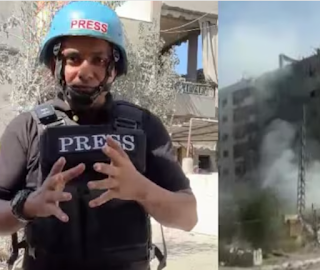As Israeli airstrikes escalate in intensity, the Hezbollah stronghold of Safra has become a ghost town, with civilians fleeing in droves amid fears for their safety. Blocked roads and bombed border crossings are forcing thousands to seek refuge in neighboring Syria, while others contemplate crossing into Iraq. The humanitarian crisis is deepening as the relentless bombardments hinder access to safety, basic necessities, and medical assistance.
Recent Israeli strikes have specifically targeted portions of the Lebanon-Syria border, where Israeli officials claim that Hezbollah leaders have been using this route to transport weapons into Lebanon to strengthen their military infrastructure. The airstrikes have left behind massive craters, effectively severing vital routes for civilians attempting to escape the violence. Footage from the region illustrates the chaos, with hundreds of vehicles lined up and stranded along the border, as families desperately seek safe passage into Syria amid ongoing hostilities and rising tensions.
The situation in Safra, a city long regarded as a Hezbollah stronghold, is particularly dire. A child from the area spoke to reporters from India Today, explaining that his family was fleeing due to the increasingly perilous conditions. "It's too dangerous to stay here," he stated, expressing his family's desperate intention to cross into Syria, with hopes of eventually reaching Iraq. The once-bustling city now presents a stark contrast, with deserted streets, shuttered shops, and buildings reduced to rubble, a grim testament to the destructive power of the airstrikes that have ravaged the community.
In light of the escalating violence, Hezbollah has imposed restrictions on public gatherings in Safra, underscoring the tense atmosphere and the group's acknowledgment of the threat posed by Israeli military operations. Despite being a traditional stronghold for the militant organization, the reality of continuous airstrikes has led to a palpable fear among residents. Hezbollah leaders have reportedly cautioned journalists against covering the situation in the area, reflecting the precariousness of the environment and the potential repercussions for those involved in reporting on the conflict.
Amidst the destruction, posters of fallen Hezbollah leaders adorn the walls of buildings, serving as haunting reminders of the ongoing conflict's toll on both the militants and the civilians caught in the crossfire. The images of these leaders symbolize the deep-rooted history and ideology that underpin Hezbollah's existence in the region, even as the organization struggles to maintain control and support among a terrified populace. For weeks, Israel has conducted a series of airstrikes across Lebanon, systematically targeting various Hezbollah positions. The Israeli military has claimed responsibility for eliminating several high-ranking Hezbollah figures, including alleged successors to the group's leader, Hassan Nasrallah, who reportedly died in an airstrike just days ago. This significant loss, according to military sources, has created a power vacuum within the organization, potentially complicating its operational capabilities and strategic direction moving forward.
The continuing violence in Lebanon raises urgent questions about the humanitarian impact of the conflict, as civilians bear the brunt of the military actions. With pathways to safety becoming increasingly blocked and the situation deteriorating, the plight of those fleeing Safra and other areas affected by the airstrikes underscores the urgent need for a resolution to the escalating conflict between Israel and Hezbollah. As families struggle to find refuge, the ongoing bombardment creates a cycle of fear and instability, with humanitarian organizations warning of a potential crisis if safe passage and aid are not provided to those fleeing the violence. The international community faces increasing pressure to respond to the unfolding disaster and to find a pathway toward peace and stability in the region, where countless lives hang in the balance amid the chaos of war.



